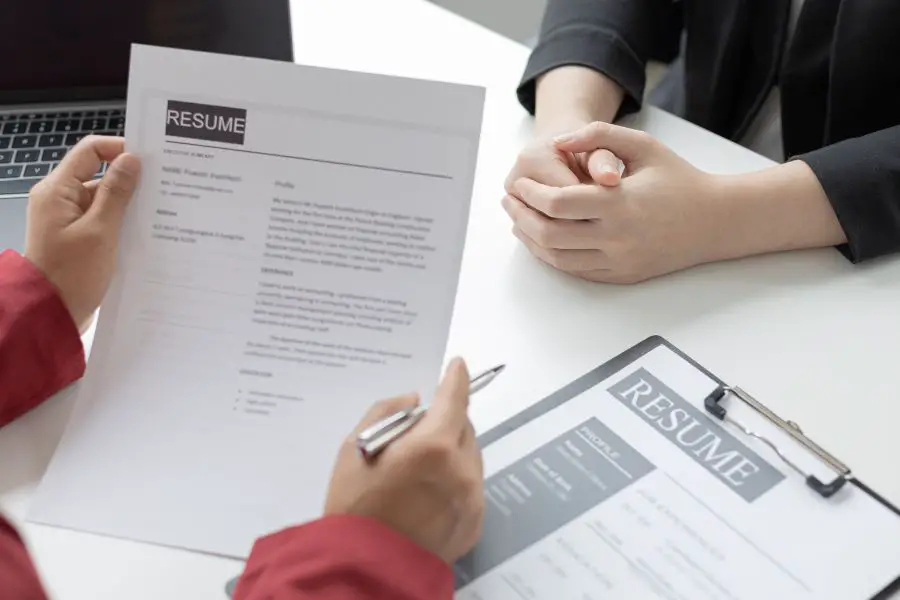Disclaimer: We sometimes use affiliate links in our content. For more information, visit our Disclaimer Page.
As a hiring manager, you always seek the best candidate for your team and organization. Critical thinking is one of the most important skills to assess during the interview process. This blog post will guide you through the importance of critical thinking interview questions, the critical thinking process and provide you with a comprehensive list of interview questions to assess critical thinking skills.
The Importance of Critical Thinking Skills
Critical thinking skills are more important than ever in today’s fast-paced and constantly evolving work environment. Critical thinkers can analyze information, make well-informed decisions, and solve problems effectively. Strong critical thinking skills are essential for navigating challenging situations and ensuring the success of your team and organization.
Critical Thinking Abilities and Problem-Solving
Critical thinking and problem-solving skills are closely related. Critical thinking abilities enable individuals to assess information objectively, identify issues, and provide rational advice. Problem-solving involves applying critical thinking skills to develop thought-out solutions and overcome obstacles.
Analytical Skills and Logical Reasoning
A key component of critical thinking is the ability to use analytical skills and logical reasoning to evaluate information and make decisions. By asking critical thinking interview questions that test analytical skills, you can identify candidates who can assess information objectively, make well-informed decisions, and solve problems effectively.
The Critical Thinking Interview Process

The interview process is ideal for assessing a candidate’s critical thinking skills. You can gain insight into their thought process, decision-making, and problem-solving abilities by asking critical thinking questions. This will help you identify candidates who have the potential to excel in your organization.
Sample Critical Thinking Interview Questions
- Describe a time when you had to solve a problem with limited information. How did you approach the situation, and what was the outcome?
This question allows you to evaluate a candidate’s ability to make decisions under pressure and with limited information. Look for answers demonstrating the candidate’s critical thinking, problem-solving skills, and ability to adapt to unexpected situations.
- Can you provide an example of a time when you had to make a difficult decision? What factors did you consider, and how did you ultimately make your choice?
This question assesses a candidate’s decision-making process and ability to weigh different factors when making tough choices. Look for well-reasoned answers that show the candidate considered multiple perspectives and used critical thinking skills to make a fair assessment.
- Describe a situation where you had to develop a new or unusual idea to solve a problem. What was your thought process and how did you implement the idea?
This question tests a candidate’s creative thinking and ability to develop innovative solutions. Look for answers demonstrating the candidate’s willingness to think outside the box and ability to take calculated risks.
Hypothetical Scenarios and Behavioral Interview Questions
In addition to asking about past experiences, you can use hypothetical scenarios and behavioral interview questions to assess a candidate’s critical thinking skills. These types of questions give you insight into how a candidate might handle specific situations in the future.
- Imagine you’re leading a team, and two teammates disagree on the best approach to a problem. How would you handle the situation?
This question assesses a candidate’s ability to navigate conflict and facilitate productive discussions. Look for answers that demonstrate active listening, empathy, and the ability to bring opposing viewpoints together to find a solution.
- You’re a project manager, and one of your team members is consistently underperforming, causing delays in the project. What steps would you take to address the situation?
This question evaluates a candidate’s ability to identify the weak link and take appropriate action to resolve the issue. Look for answers that show the candidate can balance the needs of the team and the individual while maintaining customer satisfaction and project goals.
- During a customer meeting, a client expresses dissatisfaction with a project’s progress and demands immediate changes. How would you handle this situation?
This question helps you assess a candidate’s ability to manage challenging situations and maintain professionalism. Look for answers that demonstrate empathy, active listening, and the ability to provide rational advice to address the client’s concerns.
Assessing Critical Thinking Skills Through Follow-Up Questions
To gain a deeper understanding of a candidate’s critical thinking skills, it’s important to ask follow-up questions. This will allow you to explore their thought process in more detail and assess how they react to new information or unexpected challenges.
- Can you explain your decision-making process when faced with a difficult choice?
This follow-up question delves deeper into a candidate’s decision-making process, allowing you to evaluate their ability to think critically and make well-informed choices. Look for answers that demonstrate structured reasoning, consideration of multiple perspectives, and the ability to project forward the potential consequences of their decisions.
- How do you handle situations where you’re unsure of the best course of action?
This question assesses a candidate’s ability to navigate uncertainty and seek assistance when necessary. Look for answers that demonstrate humility, the willingness to ask for help, and the ability to adapt their approach based on new information.
The Role of Soft Skills in Critical Thinking
While assessing critical thinking skills is essential, it’s also important to consider the role of soft skills in the recruitment process. Soft skills, such as communication, teamwork, and adaptability, can greatly impact candidates’ ability to effectively apply their critical thinking skills.
- How do you approach working with team members with different opinions or perspectives?
This question evaluates a candidate’s ability to collaborate with diverse team members and consider opposing viewpoints. Look for answers demonstrating empathy, active listening, and the willingness to engage in constructive discussions to reach a consensus.
- Describe a time when you had to adapt your communication style to effectively convey a complex idea or concept to a non-expert.
This question assesses a candidate’s ability to communicate complex information clearly and concisely. Look for answers that show the candidate can tailor their communication to suit their audience and ensure understanding.
Related: Interview Questions for Internal Promotions
Hiring Strategy and the Role of Critical Thinking Interview Questions

Incorporating critical thinking interview questions into your hiring strategy can help you identify candidates who possess strong critical thinking skills and are more likely to succeed in your organization. You can gain insight into a candidate’s thought process, decision-making abilities, and problem-solving skills by asking various critical thinking questions.
Aligning Interview Questions with Job Requirements
When selecting interview questions for critical thinking, aligning them with the specific job requirements outlined in the job description is essential. This will ensure the questions are relevant to the role and provide valuable insights into candidates’ suitability for the position.
- How do you approach analyzing large amounts of data to make informed decisions?
This question is particularly relevant for roles that require data-driven decision-making. Look for answers demonstrating the candidate’s ability to analyze data, identify trends, and make data-driven decisions.
- Describe a time when you had to make a quick decision with limited information. What was your thought process, and how did you arrive at your decision?
This question is well-suited for roles that require rapid decision-making in high-pressure situations. Look for answers that show the candidate’s ability to think critically under pressure and make well-informed decisions despite limited information.
Related: Interview Questions About Management Style
Job-Specific Critical Thinking Questions
Tailoring critical thinking interview questions to the specific job role can provide valuable insights into a candidate’s ability to excel in the position and adapt to the unique challenges they may face.
- As a team leader, how do you ensure your team members’ diverse perspectives and ideas are considered when making decisions?
This question is relevant for leadership positions and assesses candidates’ ability to promote inclusivity and collaboration within their teams. Look for answers demonstrating the candidate’s ability to encourage open communication, actively listen to team members, and facilitate constructive discussions.
- Describe a situation where you had to consider multiple potential solutions to a problem. How did you evaluate each option and choose the best course of action?
This question is suitable for roles that involve complex problem-solving and decision-making. Look for answers that showcase a candidate’s ability to assess various options objectively, weigh the pros and cons, and make well-informed decisions.
Assessing Critical Thinking Skills Through Past Performance
In addition to hypothetical scenarios and behavioral questions, you can also evaluate a candidate’s critical thinking skills by discussing their past performance in previous roles. This can provide valuable insights into their ability to apply critical thinking skills in real-world situations.
- Can you provide an example of a challenging situation you faced in your previous job and how you used your critical thinking skills to overcome it?
This question assesses a candidate’s ability to apply critical thinking skills in a professional context. Look for answers demonstrating the candidate’s ability to analyze the situation, identify the root cause, and develop a well-reasoned solution.
- Describe a time when you had to persuade a colleague or supervisor to adopt a new or unusual idea. What was your approach, and what was the outcome?
This question evaluates a candidate’s ability to advocate for innovative solutions and persuade others of their merit. Look for answers demonstrating effective communication, empathy, and the ability to present a compelling argument.
Related: Questions To Ask a New Employee
The Role of the Hiring Process in Assessing Critical Thinking Skills

The hiring process is a crucial opportunity to assess candidates’ critical thinking skills and determine their suitability for the role. By incorporating critical thinking interview questions throughout the recruitment process, you can identify candidates with the necessary skills to excel in the position and contribute to the success of your organization.
HR Professionals and the Importance of Critical Thinking in Hiring Decisions
HR professionals play a vital role in the hiring process and can greatly influence the selection of candidates with strong critical thinking skills. By prioritizing critical thinking during the interview process and collaborating with hiring managers to develop targeted interview questions, HR professionals can help ensure that the organization’s hiring decisions are well-informed and future-proof.
Incorporating Critical Thinking Questions in the Job Interview
Incorporating critical thinking questions into the job interview can help gauge a candidate’s ability to think critically and solve problems effectively. You can comprehensively understand a candidate’s critical thinking abilities by asking a range of questions, including those focused on past experiences, hypothetical scenarios, and behavioral situations.
Evaluating Responses to Critical Thinking Questions
When evaluating a candidate’s responses to critical thinking questions, it’s important to consider their thought process, decision-making abilities, and problem-solving skills. While there may not always be a clear right or wrong answer, strong answers should demonstrate the candidate’s ability to think critically, assess information objectively, and make well-informed decisions.
Providing Feedback and Making the Final Decision
After evaluating a candidate’s responses to critical thinking interview questions, it’s important to provide feedback to the candidate and make a final decision based on their overall performance. By considering the candidate’s critical thinking abilities in conjunction with their technical skills and experience, you can make a well-informed hiring decision that benefits both the candidate and the organization.
Related: What To Say at the End of an Interview
Conclusion
Critical thinking skills are more important than ever in today’s fast-paced and complex business environment. By asking the right interview questions, you can assess a candidate’s critical thinking abilities and ensure you hire the right person for the job. Look for candidates who can think critically, solve complex problems, and make informed decisions.





